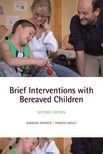 Brief Interventions with Bereaved Children (2nd edn)
Brief Interventions with Bereaved Children (2nd edn)
Published online:
17 November 2011
Published in print:
26 November 2009
Online ISBN:
9780191730313
Print ISBN:
9780199561643
Contents
-
-
-
-
-
-
-
-
-
-
-
-
-
-
-
-
-
-
-
-
-
-
-
-
Introduction and history Introduction and history
-
Important components of the practical structure, such as child care and transport Important components of the practical structure, such as child care and transport
-
Operating a subtle and gentle hierarchy within a user control/self-help philosophy Operating a subtle and gentle hierarchy within a user control/self-help philosophy
-
-
Some individual anonymized ‘grief histories’ Some individual anonymized ‘grief histories’
-
Boundary setting, assimilation, and direction Boundary setting, assimilation, and direction
-
How does the group recruit and assimilate new members who may be at different points of adjustment post-bereavement? How does the group recruit and assimilate new members who may be at different points of adjustment post-bereavement?
-
How participants' common needs and different needs determine the length of individual attendance at the group How participants' common needs and different needs determine the length of individual attendance at the group
-
Rules including potential child protection issues and mental health issues Rules including potential child protection issues and mental health issues
-
Handing over the group to new facilitators Handing over the group to new facilitators
-
-
Topic Agenda Topic Agenda
-
Summary Summary
-
References References
-
-
-
Chapter
20 Crossing the great barrier grief
Get access
Pages
243–250
-
Published:November 2009
Cite
Sinclair, Stewart, 'Crossing the great barrier grief', in Barbara Monroe, and Frances Kraus (eds), Brief Interventions with Bereaved Children, 2nd edn (Oxford , 2009; online edn, Oxford Academic, 17 Nov. 2011), https://doi.org/10.1093/acprof:oso/9780199561643.003.0021, accessed 14 May 2025.
Abstract
This chapter discusses the service provision for those who are parents of young and teenage children and have lost their spouses. The discussion also pinpoints the gaps in this service provision, and provides several personal accounts of people who have dealt with such a loss. Furthermore, the chapter also looks at parent/carers groups and their components, structure, boundaries, and needs.
You do not currently have access to this chapter.
Sign in
Personal account
- Sign in with email/username & password
- Get email alerts
- Save searches
- Purchase content
- Activate your purchase/trial code
- Add your ORCID iD
Purchase
Our books are available by subscription or purchase to libraries and institutions.
Purchasing informationMetrics
View Metrics
Metrics
Total Views
16
11
Pageviews
5
PDF Downloads
Since 10/1/2022
| Month: | Total Views: |
|---|---|
| October 2022 | 1 |
| December 2022 | 2 |
| January 2023 | 2 |
| March 2023 | 1 |
| October 2023 | 1 |
| November 2023 | 2 |
| February 2024 | 2 |
| May 2024 | 1 |
| June 2024 | 1 |
| July 2024 | 2 |
| October 2024 | 1 |
Citations
Get help with access
Institutional access
Access to content on Oxford Academic is often provided through institutional subscriptions and purchases. If you are a member of an institution with an active account, you may be able to access content in one of the following ways:
IP based access
Typically, access is provided across an institutional network to a range of IP addresses. This authentication occurs automatically, and it is not possible to sign out of an IP authenticated account.
Sign in through your institution
Choose this option to get remote access when outside your institution. Shibboleth/Open Athens technology is used to provide single sign-on between your institution’s website and Oxford Academic.
If your institution is not listed or you cannot sign in to your institution’s website, please contact your librarian or administrator.
Sign in with a library card
Enter your library card number to sign in. If you cannot sign in, please contact your librarian.
Society Members
Society member access to a journal is achieved in one of the following ways:
Sign in through society site
Many societies offer single sign-on between the society website and Oxford Academic. If you see ‘Sign in through society site’ in the sign in pane within a journal:
If you do not have a society account or have forgotten your username or password, please contact your society.
Sign in using a personal account
Some societies use Oxford Academic personal accounts to provide access to their members. See below.
Personal account
A personal account can be used to get email alerts, save searches, purchase content, and activate subscriptions.
Some societies use Oxford Academic personal accounts to provide access to their members.
Viewing your signed in accounts
Click the account icon in the top right to:
Signed in but can't access content
Oxford Academic is home to a wide variety of products. The institutional subscription may not cover the content that you are trying to access. If you believe you should have access to that content, please contact your librarian.
Institutional account management
For librarians and administrators, your personal account also provides access to institutional account management. Here you will find options to view and activate subscriptions, manage institutional settings and access options, access usage statistics, and more.